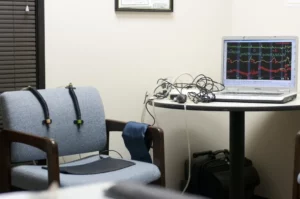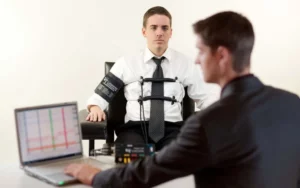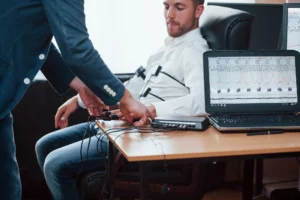So your partner has been acting suspicious lately. You can’t help but wonder if they’re being unfaithful. The sneaking around, extra time spent at work, and guarded smartphone have you thinking they might be cheating on you. Before you confront them or make any accusations, you’re considering having them take a polygraph test to get to the truth.
Polygraph tests, often called lie detectors, are controversial but commonly used by people who suspect their partner is cheating. While not 100% accurate, they aim to detect lies by measuring changes in physiological responses. If you’re thinking of asking your partner to take one, there are some important things to know beforehand.
What Is a Polygraph Test and How Does It Work?

A polygraph test uses sensors to measure different physiological responses as a person answers a predetermined set of questions. Changes in things like blood pressure, pulse, respiration, and sweat gland activity may indicate lying or deception.
During a polygraph for infidelity, you’ll sit with your partner in a room with the polygraph examiner. Sensors will be attached to your partner to measure the aforementioned physiological responses. The examiner will ask a series of questions, including control questions and relevant questions specifically about your suspicions of cheating. Your partner’s reactions to the relevant questions are compared to the controls. Significant changes may mean they are being deceitful.
Questions Asked During an Infidelity Test
Polygraphs focus on the situation at hand, in this case, potential cheating. The examiner will ask your partner several types of questions, including:
- Irrelevant questions: Basic questions like name and date of birth, used to establish a baseline.
- Control questions: Broad questions about general honesty, such as “have you ever told a lie?”
- Relevant questions: Direct questions about the specific suspicions, like “have you had sexual contact with someone other than your partner?”
- Comparison questions: Questions similar to but less serious than the relevant ones, such as “have you ever had an attraction to someone else?”
The number and type of questions can vary based on your unique situation. You may be able to provide input on relevant questions you want asked. Just keep in mind that true-or-false questions work better than open-ended ones.
Preparing for the test

If you and your partner decide to pursue polygraph testing, some preparation will optimize the experience:
- Pick an experienced, reputable examiner. Look for one certified by the American Polygraph Association. They have extensive training and abide by a code of ethics.
- Avoid influencing your partner beforehand. Don’t excessively accuse or talk about your suspicions. This can skew results.
- Be honest about your reasons for testing. If your partner knows it comes from a place of love rather than just suspicion, they may be more cooperative.
- Review the questions together beforehand. This ensures you’re both comfortable with what will be asked.
- Follow any pre-test instructions. The examiner may recommend fasting or avoiding stimulants beforehand.
- Remember it’s voluntary. Your partner has to consent and has the right to stop at any time. Don’t coerce them into it.
Proper preparation creates the best environment for accurate, reliable results.
Polygraph Test Process Step-by-Step
Wondering what actually happens during a test for infidelity? The process involves three main phases:
1. Pre-test interview
The examiner will explain how everything works and establish a connection with your partner. They’ll review the questions together and get your partner’s side of the situation. This interview can take up to an hour.
2. Polygraph testing
Your partner will be connected to the sensors measuring physiological activities. The examiner will begin asking the questions while closely observing reactions. There may be multiple rounds with slightly varied questions. This is the actual lie detection part, lasting around 90 minutes.
3. Post-test interview
The examiner analyzes the results, looking for significant reactions to relevant questions. They will go back over the data with your partner. The partner has a chance to explain reactions or provide any other information. You may or may not be included in this debrief.
The whole appointment can take a few hours from start to finish. It’s an intensive process for all parties involved.
Accuracy and Validity

The biggest question surrounding polygraphs is how well they actually detect lies. There is much scientific debate around their capabilities, but they remain popular in cases of suspected cheating.
On average, polygraph tests have about an 88-95% accuracy rate under optimal conditions. However, several factors can interfere with results:
- The examiner’s training, skill, and analysis method
- Emotional state of the person being tested
- Medical conditions like high blood pressure
- Countermeasures like controlled breathing techniques
- Lying about insignificant details
- Subjectivity in interpreting physiological changes
Making Decisions After Results
Once you have the results, don’t jump to conclusions. Look at the whole context.
If your partner passed with no signs of deception, don’t assume it’s 100% proof of innocence. False negatives are possible. But you may be able to start rebuilding trust.
If your partner failed with significant reactions during relevant questions, it likely confirms your suspicions. However, don’t immediately end the relationship until you’ve had an honest conversation. There could be misunderstandings or opportunities to work things out.
Most importantly, avoid aggressive knee-jerk reactions no matter the results. Take time to process it all. Seek counseling if needed. Listen to your partner’s side. With patience and communication, even confirmed infidelity doesn’t have to mean the relationship is doomed.
The Pros and Cons

Still undecided if a polygraph is right for your situation? Here are some potential upsides and downsides to weigh:
Pros:
- Provides partial validation of suspicions
- Can encourage confessions beforehand
- Objective third party assessment
- Sense of taking action
Cons:
- Not 100% accurate
- Intrusive nature damages trust
- Difficult to interpret inconclusive results
- Risk of false positives or negatives
- Expense of hiring examiner
- Doesn’t change underlying relationship issues
Take time to carefully consider if the potential benefits outweigh the limitations and risks. Getting to the truth is important but protecting the relationship should be the priority.
Alternatives
There are other options that may better suit your needs:
- Seek counseling. A therapist can help you communicate and unpack emotions in a healthy way.
- Check phone records. Look for suspicious numbers dialed or texts sent.
- Monitor social media. Activity pointing to secret relationships may arise.
- Hire a private investigator. They can potentially uncover evidence of cheating through surveillance.
- Install hidden cameras. Catching a spouse in the act on video leaves little doubt.
- Check credit card/bank accounts. Look for gifts, hotels or other spending indicating infidelity.
- Trust your instincts. If many signs point to cheating, assume there’s fire causing the smoke.
Moving Forward

Suspecting your partner is cheating is an extremely difficult situation. While a polygraph test may offer some answers, it cannot fix underlying problems. If your relationship is to survive infidelity, effort must be made on both sides.
Be willing to hear your partner out, seek professional help together, and spend time rediscovering why you fell in love in the first place. Set healthy boundaries but also offer forgiveness when warranted. Repairing broken trust after polygraph-confirmed cheating is challenging but not impossible with commitment to open communication.
There may also come a point when ending the relationship is the healthiest option if your partner refuses to stop extramarital affairs. This too can be handled compassionately through therapy and mediation.
Regardless of your polygraph results and subsequent actions, peace and healing happen with time. If your love is meant to endure, it can overcome even the strongest suspicions through mutual understanding. Trust yourself to handle whatever comes next with grace.

